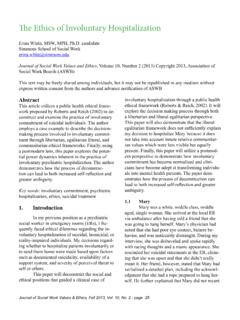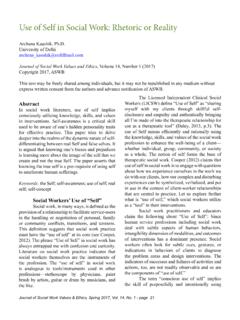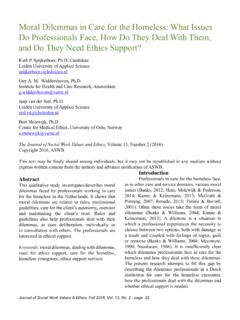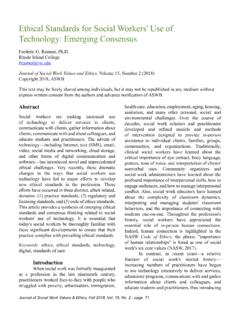Transcription of Ethnicity, Values, and Value Conflicts of African American ...
1 Journal of social Work Values & Ethics, Fall 2018, Vol. 15, No. 2 - page 37 ethnicity , Values, and Value Conflicts of African American and white social Service ProfessionalsAndrew Edwards, MSW, State University, Emeritus M. Seck, State University of social Work Values and Ethics, Volume 15, Number 2 (2018) Copyright 2018, ASWB This text may be freely shared among individuals, but it may not be republished in any medium without express written consent from the authors and advance notification of aspect of a broader study included 110 (68 white /European American and 42 Black/ African American ) social service professionals. The primary focus of this aspect of the study was to verify the Value orientation or core beliefs of the practitioners who deliver services to clients through social service agencies and programs.
2 The conceptualization of the core beliefs explored the values and Value Conflicts in relation to professional practice. The participants were employed in a Midwestern metropolitan region. They responded to a survey instrument that included vignettes, closed-ended items, scaled responses, as well as either-or type items. Major categories of the exploration included: life and death issues, lifestyle, domestic and social perspectives, Value Conflicts with the social work profession, and personal responses to Value Conflicts . Specific items measuring values related to abortion, homosexuality, religiosity, euthanasia, and corporal punishment were included. Study results showed statistical significance on 26 issues as African American participants were compared with white participants.
3 Keywords: Value Conflicts , social work, ethical dilemmas, ethnicity , professional relationship IntroductionThe complexity of American society (Jarrett, 2000), specifically due to its historic, economic, social , and ethnic makeup, requires that social work professionals take their clients ethnicity , values, and professional -client Value Conflicts into consideration. Historical dynamics, such as unproductive treatment, have contributed to the reluctance of various population groups to engage with professional service providers. This history (Barker, 2014) has influenced the adoption of guidelines that require social workers to be culturally aware during interventions and recognizing that diversity-related characteristics have influence upon an individual s thoughts, feelings, and behaviors.
4 Barker (2014) further noted that the concept of values is influenced by one s perceptions of what comprises appropriate principles, practices, and behaviors. An individual s personal values are often considered as a representation of one s core beliefs and what an individual may perceive as right. Therefore, these beliefs do not require supporting evidence for those who embrace them and may result in behavioral and attitudinal guidelines. The expression of values helps individuals to verify and/or maintain their integrity and self-worth. Therefore, for the purpose of this study, values were categorized according to the following: (1) social , Journal of social Work Values & Ethics, Fall 2018, Vol.
5 15, No. 2 - page 38 ethnicity , Values, and Value Conflicts of African American and white social Service Professionals (2) cultural, (3) religious, (4) professional , and (5) personal ReviewThe National Association of social Workers (NASW) Code of Ethics outlines specific values and standards for professional practice. As professionals, it is critical to abide by the standards of the profession in addition to engaging in efforts to promote self-awareness. The awareness of one s own personal values will allow the social worker to recognize and confront Value dilemmas that may impede professional practice. As noted, for the purposes of this study, values were identified across five categories.
6 The social values category (Barboza, 1998; Sears & Osten, 2005) includes principles, customs, and beliefs that are generally accepted as norms of a particular society. These types of values are regulated by social pressures rather than public policy. For example, appreciation of loyalty, honesty, and a work ethic represent social values. Specific ethnic codes of conduct are expressions of social values because they are embraced by a major segment of society and regarded as correct ways of thinking and behaving. In contrast, cultural values (Edwards, 2014) is a category that represents norms and standards integrated into public policy. In other words, cultural values are institutionalized as standards for the American culture.
7 For example, education and equality (Clay, Lingwall, & Stephens, 2012; Imber & VanGeel, 2000) are addressed through laws that require some form of educational activity for American youth. The religious values category (Edwards, 2014; Edwards 2000) reflects behavioral guidelines for those who identify as members of specific faith communities. These values are typically written in doctrinal statements and refer to a type of holy reference book as the foundation for the principles. Examples of religious values relate to sexual behavior, interpersonal behavior, dietary restrictions, and childrearing methods. The professional values category consists of standards and principles designed to regulate the behavior of those who practice within a specific profession.
8 For example, the National Association of social Workers (NASW, 2017) Code of Ethics identifies social work values including respecting the dignity and worth of an individual and one s right to self-determination. In contrast, the personal values category (Edwards, 2014) reflects when individuals adopt aspects of the previous four Value categories as guiding principles for their lives. In relation to professional social work practice, a practitioner may experience an internal struggle (Edwards, 2014) when compelled to engage in behaviors or tasks that are contradictory to one or more aspects of one s core belief system. As a result, a Value conflict may occur which refers to a disagreement between one s core belief system and that of a group, organization, or society (Edwards & Allen, 2008).
9 Consequently, some professionals who face Value Conflicts when providing services become perplexed or even omit some tasks associated with completing their professional obligation. As a result, Value Conflicts may hinder the social worker-client relationship necessary for appropriate service provision. Zastro and Kirst-Ashman (2010) suggested that many decisions, both personal and professional , are influenced by one s beliefs about life, freedom, and protective standards. Furthermore, social work competence (Segal, Gerdes, & Steiner, 2016) requires self-awareness and a commitment to social justice, which supports the need to explore personal values.
10 As a result, the current study sought to examine the experiences of Black/ African American and white /European American social service providers based on their ethnicity , values, and Value Conflicts in relation to their personal are an important manifestation of values particularly when there are Conflicts pertaining to values such as equality and economic security. However, there may be occasions when a person must choose one of these values based upon what it means in relation to a specific social or economic circumstance. Jacoby (2006) suggested that values have a hierarchy and may reorder themselves based upon specific situations.









